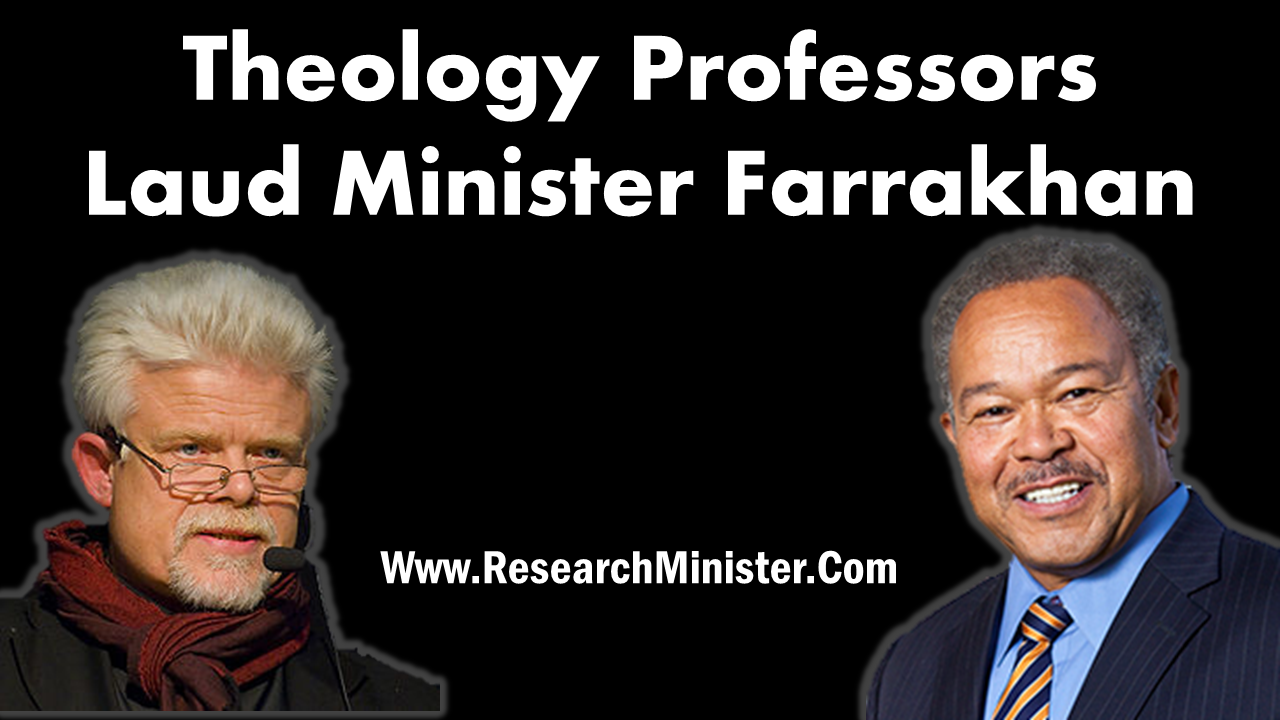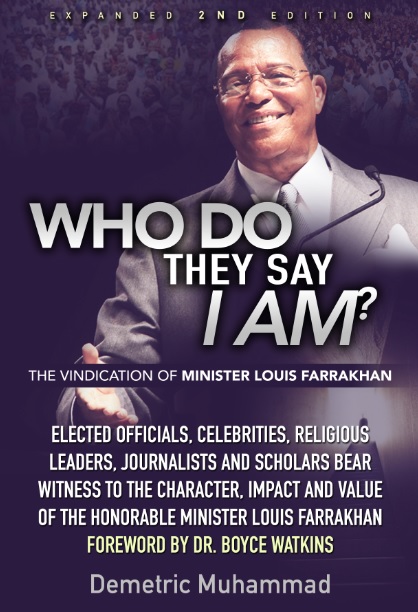Theology Professors Laud Minister Farrakhan
“The mainstream media has worked very hard to hide what important, thoughtful and serious men and women have said about the Honorable Minister Louis Farrakhan. Despite this strategic omission of the Minister’s laudatory reactions from a bevy of the world’s most important men and women, those testimonies have been captured and preserved to vindicate the Minister’s noble name and person within the court of public opinion. Below, find a sampling of these character witness testimonies from two professors of theology. These and more character witness accounts for the Minister can be found in the book Who Do They Say I Am: The Vindication of the Honorable Minister Louis Farrakhan.”
“But what is Farrakhan’s role in the political realm today? First, he is a prosecuting attorney on behalf of this nation’s poor and oppressed minorities. He understands his role to be one of forcefully pointing out discrepancies between American political rhetoric and the reality of black American life. His eloquence and analytic gifts, extraordinary memory, and refined debating skills uniquely qualify him to represent the cause of the unemployable masses which most civil rights organizations and churches have not consistently advanced.
Farrakhan speaks to black audiences in a manner that resembles old southern preachers who preach for two or three hours without notes, modulating their presentations between impassioned intensity and humorous, mischievous conversation. One has to sit in his presence to appreciate the quality of his dramatic performance. Many young blacks have been motivated (some would say seduced) by Farrakhan’s charisma. Unemployed young people have banded with him, and he has given them hope. Many cannot read or write and are therefore ineligible for the job opportunities which Rev. Jackson and other civil rights leaders generate through protest and bargaining. Farrakhan demonstrates to such young people that after they have been rejected by the wider society they have a chance to become self-respecting persons within their own community.
He has gone into prisons and helped to reform numbers of America’s most troublesome population. He has preached family stability and male-female mutual respect in a way that makes him sound more like Jerry Falwell than Malcolm X. But the black underclass has embraced his conservative ethical teachings and his Dale Carnegie-style lessons on personal hygiene, dress, manners, and salesmanship…
Second, Farrakhan is a prosecuting attorney for the Islamic faith and Afro-American Muslims. No other non-Christian leader in black America has so forcefully indicted the Christian tradition for its tacit and explicit racism, classism and hypocrisy, and still managed to command large audiences in the most prestigious churches across the nation. Farrakhan knows the Christian tradition intimately from his years as an altar boy in the Episcopal Church.
Indeed, I think that he is drenched with the Anglicanism of his formative years. He believes that all things should be done decently and in order, that religion is a matter of rational understanding and that religious authorities, hierarchy, and traditions should be respected-all motifs which are emphasized in most quarters of the Episcopal community. Farrakhan also reminds us that Islam is not a parochial Arab tradition but a world-wide religion that creates a global community of Muslims who worship Allah.” (Franklin 2001)
“Black Islamic nationalism has become widely popular among Black urban youth, and Farrakhan exerts an influence with these youths that far exceeds the actual membership of his organization. This is truly significant, given the fact that the African American urban population is a young population, with a median age of 24.9 years old for blacks compared to 34.6 years for the other city dwellers. The vitality of Black Islam as an integral part of contemporary black youth culture is visible in the new Black independent movies, in the hip-hop movement, in artifacts and clothing, in literature and comics, in college life, in graffiti and other arts, and in gang symbolism. Farrakhan has a unique capability …able to reach deeply into the souls of black youths…is able to talk to them in a way that really makes them listen…this rapport enables Farrakhan to criticize and redirect destructive behavioral patterns…
His long lectures are composed much like orchestral numbers. He starts by displaying a theme, and then varies the expressions, moving his audience to tears and laughter, serious consideration and explosive anger, before reaching the grand finale in which he dramatically drives his points through. Farrakhan combines a number of diverse roles during each sermon, such as the strong warrior, the trickster, the stern father, the heart warmer, the stand-up comedian, the encyclopedic scholar and the Doomsday prophet. As is common in the black church, a kind of dialogue is established as the preaching evokes responses from the audience, with the worshipers shouting cries of approval such as “That’s right,” “Tell it like it is,” “Go on, Minister, go on,” and “Teach, Brother teach.”
There is no doubt that Farrakhan’s oratorical brilliance contributes heavily to his rising popularity and explains, in part, the crowds that jam auditoriums when he speaks. Farrakhan is able to attract larger audiences than any other black spokesperson: 35,000 people showed up at Madison Square Garden, New York; 17,000 in Los Angeles; 26,000 in Detroit; 19,000 and then 15,000 in Atlanta; 15,000 in Chicago; 21,000 at Jacob Javits Center in New York, and 10,000 in Baltimore.” (Gardell 1996)

